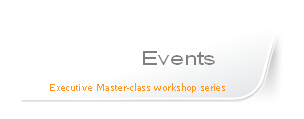
© 2013 IGROW EEIG






World class event
in the last month of
Ireland Presidency
of the EU Council
in the last month of
Ireland Presidency
of the EU Council
18-19 June 2013
Dublin - Ireland


Participants are encouraged to contribute presentations in each of the following sessions.
Session 1. Enabling Tools and Technologies: this session explores the potential of latest advances in cloud computing, machine vision, decision support, media, knowledge management, and mobile technologies to address the resources scarcity challenge.
Session 2. Resources scarcity challenges in the food sector: this session addresses vital issues such as food health and safety, the use of biotechnology in the food sector, and decision support technologies for equitable pricing and distribution of food resources. Leveraging the computational power of cloud computing and machine vision to advance and promote food health and safety will be addressed. Participants are encouraged to present and share case studies, from around the world, describing best practices of the use of technologies to address the food scarcity problem.
Session 3. Resources scarcity challenges in the energy sector: this session covers technologies for management of energy consumption and the development of alternative sources of energy. Participants are encouraged to present and share case studies and success stories from Ireland and other countries, in the management of energy resources. National plans to attain various energy efficiency targets are invited for presentation and discussion.
Session 4. Resources scarcity challenge in the water sector: this session covers information and computer based technologies to manage water resources on the demand and supply sides. On the demand side, the use of various tools and technologies for efficient water metering, raising public awareness of efficient use of water, and the control of water consumption will be presented. On the supply side, computer based technologies to ensure water purity, wastewater treatment, and flood risk monitoring will be presented. Participants are encouraged to present and share case studies and national and international plans to address the challenge of water scarcity and ageing water infrastructures.
Session 5. The promotion of eco active and healthy life style: this session covers various media based technologies to promote preventive healthcare and motivate an eco, active, and healthy life style. Participants with primary care and ICT background are encouraged to present and demonstrate technologies such as LIVE video to promote active and healthy life style.
Click to download template for presentation / speaker profile (Word) (PDF)
Session 1. Enabling Tools and Technologies: this session explores the potential of latest advances in cloud computing, machine vision, decision support, media, knowledge management, and mobile technologies to address the resources scarcity challenge.
Session 2. Resources scarcity challenges in the food sector: this session addresses vital issues such as food health and safety, the use of biotechnology in the food sector, and decision support technologies for equitable pricing and distribution of food resources. Leveraging the computational power of cloud computing and machine vision to advance and promote food health and safety will be addressed. Participants are encouraged to present and share case studies, from around the world, describing best practices of the use of technologies to address the food scarcity problem.
Session 3. Resources scarcity challenges in the energy sector: this session covers technologies for management of energy consumption and the development of alternative sources of energy. Participants are encouraged to present and share case studies and success stories from Ireland and other countries, in the management of energy resources. National plans to attain various energy efficiency targets are invited for presentation and discussion.
Session 4. Resources scarcity challenge in the water sector: this session covers information and computer based technologies to manage water resources on the demand and supply sides. On the demand side, the use of various tools and technologies for efficient water metering, raising public awareness of efficient use of water, and the control of water consumption will be presented. On the supply side, computer based technologies to ensure water purity, wastewater treatment, and flood risk monitoring will be presented. Participants are encouraged to present and share case studies and national and international plans to address the challenge of water scarcity and ageing water infrastructures.
Session 5. The promotion of eco active and healthy life style: this session covers various media based technologies to promote preventive healthcare and motivate an eco, active, and healthy life style. Participants with primary care and ICT background are encouraged to present and demonstrate technologies such as LIVE video to promote active and healthy life style.
Click to download template for presentation / speaker profile (Word) (PDF)
Scientific impact
The main scientific impact will be in advancing research, development and innovation in:
• integrated tools and technologies to address the various dimensions of the resources scarcity problems in various sectors and various countries
• the use of cloud computing, machine vision, decision support, knowledge management, wireless and media technologies to form an ecosystem of sustainable growth services
• customized user friendly sustainable growth digital services tailored to the need of triple helix entities.
• integrated tools and technologies to address the various dimensions of the resources scarcity problems in various sectors and various countries
• the use of cloud computing, machine vision, decision support, knowledge management, wireless and media technologies to form an ecosystem of sustainable growth services
• customized user friendly sustainable growth digital services tailored to the need of triple helix entities.
Dissemination materials
• A workshop booklet will be printed and made accessible online as an e-book for a wider audience. It includes: information about the various sessions and presenters in each session, the structure of the workshop, the agenda, a brief description of the various talks, the themes motivated during the panel discussion, a brief description of the event sponsors, and various scientific and cultural information about Dublin "the City of Science".
• Contributors to the workshop (keynote presentation, sessions, panel discussion) will be asked to submit their contribution as a book chapter to be published in a book on "eco-system for sustainable growth services".